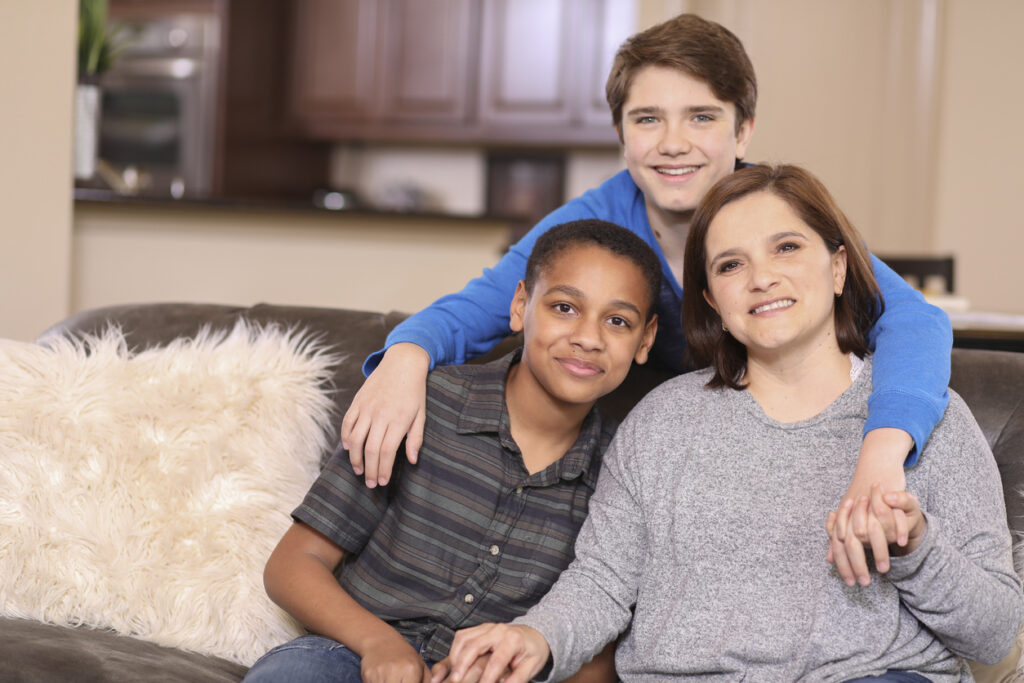Foster Care and Adoption Services in North Carolina
Answer the Call to Love with Our Supportive Foster Care and Adoption Programs

Across North Carolina, thousands of children are in need of a new place to call home. With more than 12,000 youth in North Carolina in need of fostering, there are more children in need than there are foster homes to support them.
Kids across North Carolina are waiting for someone like you with an open heart and an open home to be their support system and be a foster parent.
Becoming a foster or adoptive parent may feel like an intimidating prospect, but when you foster through Children’s Hope Alliance, you aren’t alone—you have a dedicated and knowledgeable team at your side, every step of the way.
As you prepare to open your heart and home to a foster child, Children’s Hope Alliance is here to answer your questions, provide support, and help provide hope to a child in need.
Ready to Start Your Application? Click Below.
Want to Learn More and Attend an Info Session? Register Now!
Just want to talk to someone? We’re ready to here from you. Call us at 844-791-3117
Jump Ahead
What Is a Foster Parent?
- Foster care is a temporary living arrangement for abused, neglected and dependent children who need a safe place to live when their parents or another relative cannot take care of them
- Our agency provides all necessary training and support for foster parents throughout the entire process.
When a birth parent is unable to care for a child, a foster parent temporarily steps in to raise the child.
Foster parents are responsible for all aspects of caring for a child while in their care, including day-to-day needs, medical appointments, education, and emotional support.
A fostering relationship can last a few weeks, months, or, if you decide to adopt the foster youth, years. The goal is almost always to reunite foster youth with their family, so most children stay in their foster home for six to 18 months.
Who Can Be a Foster Parent?
Foster parents do not fit into a one-size mold. They are young and old, married and single, experienced parents and new ones.
But all foster parents share a passionate dedication to helping their community and the children in it by providing a home and support for foster youth.
Many people who want to give back by fostering worry that they aren’t qualified to do so, but in fact, almost anyone can foster. You don’t have to be married or own a house. You only need to have
- A reliable source of income,
- A safe home with an extra room, and
- A good sense of humor to deal with the inevitable challenges of fostering!
Foster Parent Support
One of the best ways to help children heal is to support the foster families providing loving homes for them. When you decide to foster through Children’s Hope Alliance, you’re never alone. Children’s Hope Alliance prides itself on being supportive of our foster parents.
Our foster families have actress to a robust array of nearly 30 specialized services, including:
- Extensive and up-to-date training
- 24-hour support, our foster care case managers stay in regular contact and are always just a phone call away.
- Respite services
- Outpatient therapeutic support programs that address whole-person wellbeing for children, teens, and adults.
- Child ACTT services to help heal hurting children throughout the community.
- Community-based services that help children and families change unhealthy behaviors by empowering them with skills and coaching.
Foster parents also receive monthly financial stipends. This stipend alleviates the costs of fostering and provides the foster child with necessities such as food, clothing, housing, daycare, school supplies, and other day-to-day expenses.
As you begin your foster parent journey, don’t hesitate to ask for help from Children’s Hope Alliance and your community. It takes a village to raise a child, and that is especially true of foster children.
How to Start the Fostering Process
Becoming a foster parent is a significant decision, but the first step is simply learning more about fostering. Children’s Hope Alliance is your partner on this journey.
Here’s how to get started:
- Attend a Foster Care Info Session to learn more about becoming a foster parent or foster-to-adopt parent through Children’s Hope Alliance. Click HERE to Register Today.
2. Speak one-on-one with a Children’s Hope Alliance case manager, who will help you navigate the next steps, which will include the application process, home application, and training schedule.
Types of Foster Care
Children’s Hope Alliance offers different levels of foster care that provide for the needs of each foster child.
By providing optimal foster parent training and support through our family-centric model, we ensure foster parents are prepared to support their foster children, no matter what challenges arise.
Foster parents can choose the commitment that works best for them, whether that’s the low intensity of family foster care or more specialized therapeutic, family-style treatment within our Intensive Alternative Family Treatment (IAFT) program.
Intensive Alternative Family Treatment (IAFT)
IAFT provides specialized training to professional foster parents so they can offer therapeutic, family-style treatment to foster youth. IAFT is a placement option for foster children who are difficult to place elsewhere because of past treatment failures, significant behavioral and emotional challenges, or the need for out-of-home care.
Family and Therapeutic Foster Care
Our family and therapeutic foster care program is often the first safe home some children have ever known. We specially train and monitor foster families to make sure every child who needs it has a safe and loving place to call home. And for foster parents, we offer 24/7 support, respite care, and other resources to ensure you’re able to care for both yourself and your foster children.
What Is Child Adoption?
- School age children, sibling groups and adolescents are available for adoption
- There are minimal costs to adopt from the N.C. foster care system for families licensed with our agency
- We offer experienced staff who provide training, licensure, placement and finalization of adoptions
- Post-adoption support services are available to ALL adoptive families in our catchment areas free of charge
Child adoption refers to the process by which a caregiver who is not a child’s birth parent takes full and legal responsibility for a child. The child becomes a full and permanent member of their adoptive family. Adoptive parents permanently assume all rights and responsibilities for the child, and their biological parents surrender those rights.
Most adoptions through the Children’s Hope Alliance’s adoption center occur through our foster care system. If the child is unable to return to their biological family and their foster family decides to adopt them, we can help facilitate and officiate this transition.
We also provide post-adoption services to support the creation and sustainability of this new, permanent family.
Children’s Hope Alliance Post-Adoption Services
Our post-adoption support serves families with children of all ages and is not time-limited. If you decide to provide a permanent home to children in need, our adoption specialists will continue to help you on your parenting journey. These services are offered free of charge.
How to Start the Foster Care Process
Becoming a foster parent is a significant decision, but the first step is simply learning more about fostering. Children’s Hope Alliance is your partner on this journey.
To get started, speak one-on-one with a Children’s Hope Alliance case manager, who will help you navigate the next steps, which will include:
- Required adoption parent training
- A home assessment
Foster Care and Adoption FAQs
In North Carolina, eligible foster parents must:
– Be 21+ years old
– Provide a stable, drug-free home
– Have a reliable income
– Be open to a criminal records check and being fingerprinted
– Complete training required by the state
– Be licensed by the state
Yes, you will be able to take a break from caring for a foster child—in fact, we encourage you to do so! Children’s Hope Alliance provides respite care to foster parents so that they can have time away from the foster child to re-energize.
While it depends on the situation, most foster parents do engage with the foster youth’s biological parents. Through scheduled visitations, foster children are able to stay connected with their families, which we always encourage when it’s best for the child.
The fostering process is collaborative in that you can set your preferences for a specific age group and which behavioral or medical needs you are comfortable meeting. Your case manager will then find the right child that matches your family values, structure, and routine.
There are more foster children in need of homes than there are foster homes in which to place them, so the need for foster parents in North Carolina is great. If you feel called to serve but have more questions, please download our free Foster Parent Guide.
Sometimes a foster child is not able to return to their family, usually as the result of a court’s decision. In this case, the foster child is adopted, either by their foster parents or another family. This is a foster care adoption.


